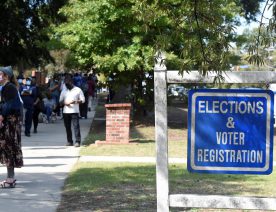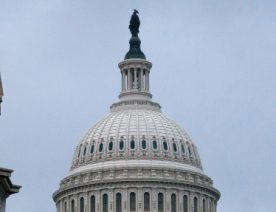
September 10, 2024
With less than two months until the U.S. presidential election, a new study from The Associated Press-NORC Center for Public Affairs Research and USAFacts finds high levels of skepticism in election information heading into November 2024.
People agree on basic standards for factual information—such as transparency (75%), providing more than one viewpoint on the subject (64%), and being devoid of opinion (57%)—but roughly a quarter find it difficult to get factual information about the candidates in the upcoming presidential election, and 34% struggle to know if election information is true or not.
When it comes to the candidates themselves, 57% of adults think Donald Trump’s campaign messages are rarely or never based on factual information, and 45% express the same doubts about Kamala Harris’s campaign.
More Republicans trust Trump and his campaign (67%) than government certifications of election results (51%) for accurate information on the outcome of the November election. In contrast, Democrats show similar levels of trust in government certifications (87%) and Harris and her campaign (82%).
Beyond the campaign trail, people are skeptical of the reliability of sources for obtaining accurate information about the government and remain doubtful of information from elected officials. Nearly half believe information from the federal government is influenced by the political beliefs of officials such as the president (49%) or members of Congress (48%). Just 10% of adults think decisions by policymakers are always or often grounded in factual information.
Only 10% of the public places a great deal of trust in information about the government on social media, but 40% report that they use social media at least once a day for government-related information. Information from the government on issues like immigration, elections, the environment, and foreign affairs is also met with mistrust, with about half of adults saying they trust it only a little or not at all.
New questions about artificial intelligence show the public’s skepticism across a range of measures. Half of adults (52%) are concerned about the future impact of AI tools on how they get information, while only 9% are excited. Nearly two-thirds (64%) are not confident that the information from AI chatbots or search results is reliable and factual. Looking ahead to this fall, only 27% trust AI even a moderate amount to provide accurate information about the outcome of the election in November, and 43% think AI will make it more difficult to find factual information about the election compared with just 16% who think it will make it easier.
The nationwide poll was conducted by The AP-NORC Center for Public Affairs Research from July 29 to August 8, 2024 using AmeriSpeak®, NORC’s probability-based panel. Online and telephone interviews were conducted with adults age 18 and older representing the 50 states and the District of Columbia. 1,019 completed the survey—990 via the web and 29 by telephone. The overall margin of sampling error is +/- 4.0 percentage points.
• Suggested Citation: AP-NORC Center for Public Affairs Research. (September 2024). State of the Facts 2024. https://apnorc.org/projects/state-of-the-facts-2024








